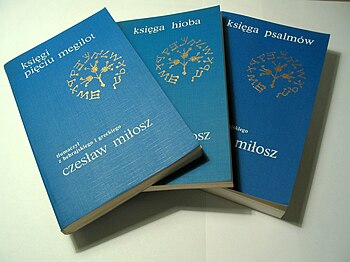With the years some english people came to believe that God prepared another world language. Though Spanish and Chinese or Sinitic languages (Sino-Tibetan language family: Mandarin, Wu, Min, Gan, Hakka, Xiang, and Cantonese sharing the common literary language wenyan) are bigger world languages, they do think that
English is that world language. And one reason is because of the preservation of the word. {Why should God’s Word be restricted to English?}
Because often those people not knowing enough the other languages and not able to compare them with the original Greek, Aramaic and Hebrew language, they like to place their own language in the first place, not seeing that in many of Bible editions in their language words were not always translated exactly or not seeing that certain words where changed in names in place to taking it for the things they meant in the original language.
In the past some English scholars knew that sometimes the Hebrew and Greek way of saying things could be too complicated for some English speaking people, of which approximately 330 to 360 million have that language as their first language. They did find God His Word so important they wanted all people, young and old, educated and not schooled ones, to be able to come in contact with those precious words. Looking at the level of reading they wanted to adapt the language of the text to such levels.
The translators wanted to keep the Divine Author in view but found it important to bring over His message. They looked at the meaning of what was said in the original text and translated or defined loosely what was meant. The (more or less) free rewording of an expression or text, as an explanation, clarification, or translation gave way to different paraphrased Bible translations.

Outside cover of Revised Version of Bible, bound in leather with a full yapp, Published by Oxford in 1885.
Others looking at such loosely translated versions started to attack those translations and got the wheel going with lots of discussions saying this or that translation was a corrupted one. Also reasons for a new translation gave the impression to others that they should doubt the sincerity of the translation. as such Muslims got food to call the Bible corrupted, looking at sayings in prefaces, like the scholars’ introduction of the Revised Standard Version of The Bible produced in 1971 as proof of this. {Christian Scholars Admit To Corrupting The Bible} In the Preface are these words:
The King James Version has grave defects…these defects are so many and so serious as to call for revision.
Under The Milky Way writes
Muslims find these statements by Christian scholars to be self-incriminating. For Christian scholars to say that the King James Version of the Bible has grave defects which require revision is taken as a self-evident admission that either the Revised Standard Version (RSV) or the King James Version (KJV) of The Bible or both have been intentionally distorted with the intention of fabricating false teaching. {Christian Scholars Admit To Corrupting The Bible}
Though this translation was called to be the first and the only officially authorised and recognised revision of the King James Version in Britain, having the Old Testament edited four years later than the New Testament, which saw the light in 1881. The Apocrypha got printed in 1894. Brooke Foss Westcott and Fenton John Anthony Hort, whose texts formed also the basic for the New World Translation (NWT) where the best known of the translation committee members. Their stated aim was
“to adapt King James’ version to the present state of the English language without changing the idiom and vocabulary,”
and
“to adapt it to the present standard of Biblical scholarship.”
To those ends, the Greek text that was used to translate the New Testament was believed by most to be of higher reliability than the Textus Receptus used for the KJV. The readings used were compiled from a different text of the Greek Testament by Edwin Palmer. {Palmer, Edwin, ΚΑΙΝΗ ΔΙΑΘΗΚΗ. The Greek Testament] with the Readings Adopted by the Revisers of the Authorised Version. London: Simon Wallenberg Press, 2007. ISBN 1-84356-023-2}
This version was adapted and revised as the “Revised Version, Standard American Edition” or getting names as American Revised Version, the American Standard Revision, the American Standard Revised Bible, and the American Standard Edition, but at the end of the 20th century commonly known as the American Standard Version (ASV). Here-fore Philip Schaff had recruited scholars from different denominations (Baptist, Congregationalist, Dutch Reformed, Friends, Methodist, Episcopal, Presbyterian, Protestant Episcopal, and Unitarian) who began work in 1872 to complete it 29 years later.
The Revised Version (both the 1885 and the American Standard Version of 1901) are some of the Bible versions that are authorized to be used in services of the Episcopal Church, the Church of England and the Anglican Communion. For the American version was chosen to bring in again God’s Divine Name and where normally the tetragrammaton stood in the original text, it is consistently rendered Jehovah in 6,823 places of the ASV Old Testament, rather than YHWH or rather than LORD as it appears in the King James Bible.
That choice of omitting God’s Name would become more important in later years, several editors afraid of publishing God’s Holy Name and therefore preferring to print the ‘meaningless’ word ‘Lord’ (in later years even omitting the big capitals) so that people could not see the difference between the Lord Most High, the Adonai Elohim Hashem Jehovah, and God His son, the other lord between the many lords.
During the mid-20th century again a revision appeared on the market wanting
“to put the message of the Bible in simple, enduring words that are worthy to stand in the great Tyndale-King James tradition.”

Revised Standard Version
In a first stage a New Testament (first edition), 1946 (originally copyrighted to the International Council of Religious Education), six years later followed by the Old Testament and thus offering the full ‘Protestant Bible’. A Catholic version was accomplished with the Apocrypha in 1957. Again receiving some modification and a Modified edition (1962) followed by the RSV Catholic Edition (RSV-CE), (NT 1965, Complete Bible 1966). those editions got again revisions with publications in 1971, 1973, an Apocrypha expanded edition (1977) and a RSV Second Catholic (or Ignatius) Edition (RSV-2CE) in 2006.
In later years, the RSV served as the basis for two revisions – the New Revised Standard Version (NRSV) of 1989, using gender-neutral language, and the Protestant evangelical English Standard Version (ESV) of 2001.
A revision in 1973 ordered the books in a way that pleased both Catholics and Protestants, dividing the library into four sections:
- The Old Testament (39 Books)
- The Catholic Deuterocanonical Books (12 Books)
- The additional Eastern Orthodox Deuterocanonical Books (three Books; six Books after 1977)
- The New Testament (27 Books)
Four years later that ‘Common Bible’ got the Apocrypha expanded to include 3 Maccabees, 4 Maccabees, and Psalm 151, three additional sections accepted in the Eastern Orthodox canon (4 Maccabees again forming an appendix in that tradition), although it still does not include additional books in the Syriac and Ethiopian canons. This action increased the Common Bible to 84 Books, making it the most comprehensive English Bible translation to date with its inclusion of books not accepted by all denominations. The goal of the Common Bible was to help ecumenical relations among the churches.
Facing all those revisions of revisions this Summer the non-profit publisher Crossway released what they are describing as a “permanent” English biblical translation which has sought to be “as literal as possible” while maintaining clarity of expression and literary excellence, but still shall need some updating. But such updating sometimes can bring wrong texts.
17 years after it was first authorized by Crossway, its publisher, the translation oversight committee changed just 52 words across 29 verses — out of more than 775,000 words across more than 31,000 verses — for what they called the final “permanent text” edition. The board then voted, unanimously, to make the text “unchanged forever, in perpetuity.”
“The text of the ESV Bible will remain unchanged in all future editions printed and published by Crossway—in much the same way that the King James Version (KJV) has remained unchanged ever since the final KJV text was established almost 250 years ago (in 1769),”
Crossway stated on its website.
One difference: While the ESV copyright is held universally by Crossway, the KJV copyright held by the Crown of England is only valid in the United Kingdom. So modified versions of the KJV have been popping up in the United States and elsewhere for several hundred years. (Christian Today has explored whether copyrights help or hurt Bible translation.)
The publisher’s intended goal was
“to stabilize the [ESV], serving its readership by establishing the ESV as a translation that could be used ‘for generations to come,’”
The editor desires for
“there to be a stable and standard text that would serve the reading, memorizing, preaching, and liturgical needs of Christians worldwide from one generation to another.”
This September they wrote:
“Our goal at Crossway remains as strong as ever to serve future generations with a stable ESV text. But the means to that goal, we now see, is not to establish a permanent text but rather to allow for ongoing periodic updating of the text to reflect the realities of biblical scholarship such as textual discoveries or changes in English over time.”
That way the same will happen to the ESV as to the KJV that people are going to think they have it about the same Bible translation, though might have a totally different version.
What happened in the past is that many people each time a new revision came unto the market, certainly with a different name several Christians reacted strongly against the new text. Lots of church members prefer a text that doesn’t and won’t ever change, not a text that is on the path of continual improvement. This also comes mainly because several denominations stick to only one Bible translation and do not, like several non-trinitarian groups, have a roster of different Bible translations to look at, taking every time an other version as standard for the next year, having their members to think about the essence of the text and not pinpointing to human doctrinal teachings or limiting themselves just to one Bible version.
Tremper Longman III, a member of the New Living Translation (NLT) committee said
But making a translation permanent ignores the need for updates that reflect scholars’ advances in their understanding of the text, as well as the continuing development of English as a living language.
He continued
“Most translators and linguists would say that such an approach to translation is actually less accurate in terms of communicating the thought of the ancient writer to a modern audience.”

A collection of Bibles in Taiwanese. (Photo credit: Wikipedia)
People should always remember that language is a living thing and by the years words may change meaning or additional (new) words may be better suited to bring over the meaning of those old writing, of which researchers still get more and new insights. Longman also remarks
“The English language changes, and my guess is that over the years even this particularly type of translation will sound more and more stilted, just as the KJV does to modern readers.”

Bible translations to polish language by Czesław Miłosz. On the left Five Megillot, in center Book of Job, on right Psalms (Photo credit: Wikipedia)
Publishers are aware that the copyrights of a publication are limited in time and as such it is more profitable to create a whole new Bible version to keep the money coming into the till. At certain times there are also new preachers of high position who want to have their notes presented in a bible version they feel good with in a language of the time they are living in, what again demands a new Bible translation, under a new name.
+
Preceding articles:
Old and newer King James Versions and other translations #1 Pre King James Bible
Old and newer King James Versions and other translations #2 King James Bible versions
Old and newer King James Versions and other translations #3 Women and versions
Old and newer King James Versions and other translations #4 Steps to the women’s bibles
Old and newer King James Versions and other translations #5 Further steps to women’s bibles
++
Additional reading
- Absolute Basics to Reading the Bible
- Finding and Understanding Words and Meanings
- Lord in place of the divine name
- Lord or Yahuwah, Yeshua or Yahushua
- Lord and owner
- People Seeking for God 7 The Lord and lords
- Another way looking at a language #5 Aramic, Hebrew and Greek
- Another way looking at a language #6 Set apart
- Trusting, Faith, Calling and Ascribing to Jehovah #13 Prayer #11 Name to be set apart
- Thou shalt worship the Lord thy God
- The Bible and names in it
- Let us recognise how great God is
- Listening and Praying to the Father
- Written to recognise the Promissed One
- Holiness and expression of worship coming from inside
- Hashem השם, Hebrew for “the Name”
- Background to look at things
- Religious people and painful absence of spring of living water
- 2001 Translation an American English Bible
- NWT and what other scholars have to say to its critics
- Some Restored Name Versions
- The most important translation…
- Accuracy, Word-for-Word Translation Preferred by most Bible Readers
- Listening and Praying to the Father
+++

From Mary Harwell Sayler’s article Lent: Let the Bible readings begin!
Further related articles
- The inspiration of Scripture
- The Preservation of Scripture
- The Challenge of Translating
- English Bible Translations
- Infographic on English Bible Translations
- How Trustworthy Are Bible Translations?
- The most important translation…
- Advice for The Church (Part 3 – Translation)
- What Makes A Bible Translation Good?
- Where was the Bible before 1611? How can we know God endorsed the KJV?
- The King James Bible and the Restoration
- The King James Removed Verses?
- Study the Word for More Than Words
- The Bible or The Watchtower?
- What is the New World Translation?
- Brief Introduction to the Greek Text of the New Testament
- I believe the King James Bible is the final authority in all matters of faith and practice.
- King James Only?
- King James Only–Refuted
- Six Reasons To Not Follow “King James Version-onlyism”
- New Testament Textual criticism
- Textual Criticism Pt. 1
- Manuscripts in the Old Testament Synagogue
- Textual Criticism Pt. 1
- Which is the best English Bible?
- 128 Source Greek Text for NT Translation
- 133 Komma Johanneum in die King James Version.
- ESV Men’s Devotional Bible
- Top Five Premium ESV Bibles for Christmas 2015 (plus two)
- The English Standard Version of the Bible
- ESV Classic Reference Bible (ESV1) in Burgundy Goatskin by R. L. Allan & Son
- ESV Journaling Bible: Interleaved Edition in Natural Brown Cowhide
- ESV Heirloom Thinline Bible in Brown Calfskin (Crossway)
- Bible Reviewer: ESV Single Column Journaling Bible
- Crossway Reverses Decision to Make ESV Bible Text Permanent
- Does the ESV Honour the Holy Spirit?
- ESV for “Joe the Bus Driver”
- (Lost in) Permanent Translation
- New International Version Bible at 50 Years
- Book Review, “Guys Slimline Holy Bible,” Tyndale House publishers
- Girls Slimline Holy Bible
- Sanctuary: A Devotional Bible for Women, New Living Translation
- Bible Review: Tyndale Select Reference Edition
- Neither Conservative or Liberal … Let’s Be Just!
- Lent: Let the Bible readings begin!
- Trinitarian Bible Society
- Was Dr. John R. Rice a Heretic?
- Straightway
- Applying God’s Holy Word
- How to Study Your Bible…a book review
- Basic Principles for “Doing Theology”
- Synod Dunnville 2016 (7)
+++
Save
Save
Save
Save
Save
Save

























 Bijbelvorsers Webs
Bijbelvorsers Webs Belgische Vrije Christadelphians / Belgian Free Christadelphians – Old Google Main Website
Belgische Vrije Christadelphians / Belgian Free Christadelphians – Old Google Main Website Christadelphian Ecclesia
Christadelphian Ecclesia Hoop tot Leven – Redding in Christus
Hoop tot Leven – Redding in Christus
Recent Comments